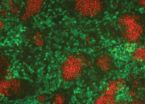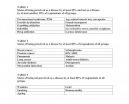(Press-News.org) Down syndrome is a neurodevelopmental disorder that is the leading cause of genetically defined intellectual disability. In the brain, Down syndrome results in alterations in the connections between neurons and a reduction in the development of new neurons (neurogenesis) that usually occurs during learning. In this issue of the Journal of Clinical Investigation, researchers led by Laura Gasparini at the Istituto Italiano di Tecnologia in Genova, Italy report that lithium, a drug commonly used for the treatment of mood disorders in humans, restores neurogenesis in the hippocampus, a part of the brain strongly associated with learning and memory. Lithium also significantly improved the performance of Down syndrome mice in tasks measuring contextual learning, spatial memory, and object discrimination. These results suggest that lithium-based therapies may help Down syndrome patients.
TITLE:
Lithium rescues synaptic plasticity and memory in Down syndrome mice
AUTHOR CONTACT:
Laura Gasparini
Istituto Italiano di Tecnologia, Genova, UNK, ITA
Phone: +3901071781519; Fax: +3901071781230; E-mail: laura.gasparini@iit.it
View this article at: http://www.jci.org/articles/view/64650?key=3cf4232a6447e03ab3e1
### END
Lithium restores cognitive function in Down syndrome mice
2012-12-03
ELSE PRESS RELEASES FROM THIS DATE:
Stem cell-derived dopaminergic neurons rescue motor defects in Parkinsonian monkeys
2012-12-03
Parkinson's disease is a degenerative disorder of the central nervous system that is characterized by tremors, rigidity, slowness of movement, and difficulty walking. It is caused by loss of the neurons that produce the neurotransmitter dopamine (known as dopaminergic neurons). One of the primary goals in Parkinson's disease research is to develop a replacement for dopaminergic neurons. In this issue of the Journal of Clinical Investigation, researchers led by Takuya Hayashi at the RIKEN Center for Molecular Imaging Science in Kobe, Japan, derived dopaminergic neurons from ...
Pygmy mole crickets don't just walk on water, they jump on it
2012-12-03
VIDEO:
Pygmy mole crickets are known to be prodigious jumpers on land. Now, researchers reporting in the Dec. 4 issue of Current Biology, a Cell Press publication, have found that the...
Click here for more information.
Pygmy mole crickets are known to be prodigious jumpers on land. Now, researchers reporting in the December 4th issue of Current Biology, a Cell Press publication, have found that the tiny insects have found an ingenious method to jump from the water, too. ...
Rules limiting aggression should reduce hockey injuries
2012-12-03
Instituting and enforcing rules that limit aggressive acts like bodychecking in ice hockey should help reduce injuries for young players, including serious brain and spine injuries, according to a new study published in CMAJ (Canadian Medical Association Journal).
"We found that interventions based on rule changes showed the greatest likelihood of making ice hockey safer for youth," writes Dr. Michael Cusimano, Division of Neurosurgery and the Injury Prevention Research Office, St. Michael's Hospital and the University of Toronto, Toronto, Ontario, with coauthors.
Brain ...
Risk of blood clots 2-fold for women with polycystic ovary syndrome on combined pill
2012-12-03
Women with polycystic ovary syndrome (PCOS) who are taking combined oral contraceptives have a 2-fold risk of blood clots compared with women without the disorder who take contraceptives, states a study published in CMAJ (Canadian Medical Association Journal).
PCOS affects between 6% and 10% of women of reproductive age with some estimates as high as 15%, making it the most common endocrine disorder in this age group. Risk factors for heart disease such as hypertension, diabetes, obesity and others are double among women with PCOS compared with women without the disorder. ...
Clinical trial hits new target in war on breast cancer
2012-12-03
Breast cancers are defined by their drivers – estrogen and progesterone receptors (ER and PR) and HER2 are the most common, and there are drugs targeting each. When breast cancer has an unknown driver, it also has fewer treatment options – this aggressive form of breast cancer without ER, PR or HER2, which was thought not to be driven by hormones, is known as triple negative. A decade ago, work at the University of Colorado Cancer Center added another potential driver to the list – the androgen receptor – and this week marks a major milestone in a clinical trial targeting ...
'Junk DNA' drives embryonic development
2012-12-03
LA JOLLA, Calif., December 3, 2012 – An embryo is an amazing thing. From just one initial cell, an entire living, breathing body emerges, full of working cells and organs. It comes as no surprise that embryonic development is a very carefully orchestrated process—everything has to fall into the right place at the right time. Developmental and cell biologists study this very thing, unraveling the molecular cues that determine how we become human.
"One of the first, and arguably most important, steps in development is the allocation of cells into three germ layers—ectoderm, ...
Grief is not a disease, but cancer is -- what about erectile dysfunction?
2012-12-03
"Understanding peoples' attitudes about whether states of being should be considered diseases can inform social discourse regarding a number of contentious social and health public policy issues," says Kari Tikkinen, MD, PhD, corresponding author of the FIND Survey.
All Finns think that myocardial infarction, breast cancer, malaria and pneumonia are diseases. People are equally unanimous that wrinkles, grief and homosexuality are not diseases. What about drug addiction or absence of sexual desire? Or erectile dysfunction, infertility or obesity?
"The word disease ...
Researchers confirm the 'Pinocchio Effect': When you lie, your nose temperature raises
2012-12-03
The University of Granada researchers are pioneers in the application of thermography to the field Psychology. Thermography is a technique based on determining body temperature.
When a person lies they suffer a "Pinocchio effect", which is an increase in the temperature around the nose and in the orbital muscle in the inner corner of the eye. In addition, when we perform a considerable mental effort our face temperature drops and when we have an anxiety attack our face temperature raises. These are some of the conclusions drawn in this pioneer study conducted at the University ...
BGI's ICG-7 and Bio-IT APAC provides updates on the latest genomics research to advance life science
2012-12-03
December 3, 2012, Hong Kong and Shenzhen, China – The 7th International Conference on Genomics and Bio-IT APAC 2012, organized by BGI, the world's largest genomics organization, successfully concluded with numerous updates on on-going research applying today's latest sequencing and bioinformatics technologies to a new paradigm of human diseases and to enhancing global agriculture development. The three-day conference, held in Hong Kong, also brought new insights into Bio-cloud and big data management. More than 300 participants attended this top-grade international conference.
The ...
Heart-warming memories: Nostalgia can make you feel warmer
2012-12-03
As the nights draw in and the temperature begins to drop, many of us will be thinking of ways to warm up on the dark winter nights. However, few would think that remembering days gone by would be an effective way of keeping warm.
But research from the University of Southampton has shown that feeling nostalgic can make us feel warmer.
The study, published in the journal Emotion, investigated the effects of nostalgic feelings on reaction to cold and the perception of warmth. The volunteers, from universities in China and the Netherlands, took part in one of five studies. ...



